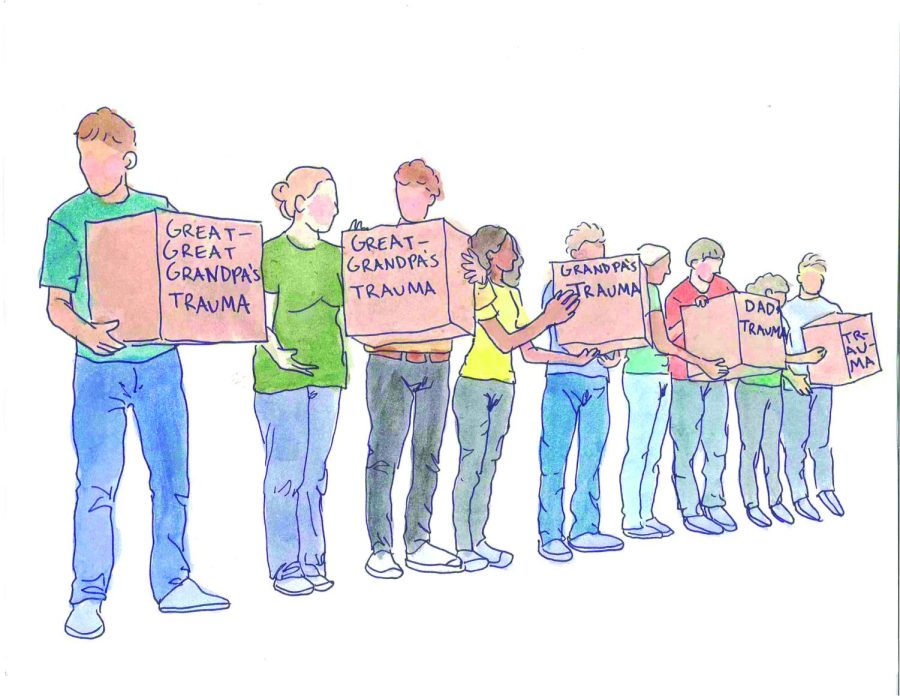EDITORIAL: Gen Z pushes the envelope to move forward from generational trauma
March 10, 2022
Gen Z pushes the envelope. We break down barriers. Our generation challenges the status quo, but for many of us, the pressure can be too much to handle.
We were born into a culture built on violence, oppression, and exploitation, and although those factors aren’t unique, we were raised in a world after 9/11, a tragedy many of us are too young to even remember. The beginnings of our childhoods were defined by a country in turmoil. We grew up in a period of flux, uncertainty, and anxiety.
We were raised in a world that has never known peace, but we are just like our parents and our grandparents and everyone to come before them. Each generation has its own defining historical events that lead to generational trauma, the passing down of trauma and oppression from one generation to the next. This can be from parents to children, but also through communities.
Addiction, domestic abuse, symptoms of divorce pervade generations and affect the way kids grow up. Our childhoods define us, and we, as a generation, want to move forward, learning to mitigate the inevitable risks of trauma following us into adulthood and further unto our children.
As we’ve grown up, we have become defined, as a generation, by this trauma, and the world is moving more quickly than ever. Social media has created a society where information is consistently available. We are always talking about it, and it has become even more of a part of us in this way.
But while trauma is viscerally painful, both mentally and physically, it’s also part of our culture and identities. Our communities are connected through a shared sense of fear, but also resilience. While it’s painful, generational trauma isn’t necessarily a cycle that can be broken. It’s a fact of life.
Like us, our families, communities, and relationships are defined by it. Rather than exhausting our energy on ending the cycle, we need to heal. We need to try to mitigate the harm we cause. Wounds left untreated in childhood often manifest in adulthood, and many of us have seen that in our own parents. We are living the consequences of our elders’ actions.
While we try to heal, we also struggle to cope. Because many of our parents never talked about mental health, we don’t even know where to start to ask for help. We’ve watched our parents quietly struggle with mental illness, never talking about it, never checking to see if we’ve followed in their footsteps.
In the U.S., 10% of our generation is diagnosed with severe major depression, yet only 40% of those people receive the care they need. At Loyola, the financial barrier has been removed, but counseling sessions every two weeks can only do so much.
Without access to proper mental health care and support, we are left to cope on our own. We turn to humor, using memes and relatable TikToks to share our experiences and laugh about our trauma, which has bonded our generation.
But when the jokes end, and we stop laughing, some of us turn to drugs and alcohol. Declining mental health exposes Gen Z to riskier behaviors, like substance abuse, according to the Addiction Center.
Gen Z had the highest score on the UCLA Loneliness Scale, despite social media, where we have thousands of people watching our every move.
And not only does social media allow us to deepen our connection with our trauma, it also gives us a distracted way to cope. Laughing rings hollow as we scroll through memes about mental illness. References to traumatic childhoods are just as relatable as posts about fashion or pets.
Despite our struggles, our generation is making an effort to be the change. We’re talking about our experiences even if they aren’t unique to our generation, and we are acknowledging that there is a problem, even when our coping mechanisms are sometimes ignoring the deeper issue of the way trauma affects us.
We can’t prevent what’s already happened or control entirely what comes next, but we can cut the shit, be real about generational trauma, and at the very least, ask for help about how to move forward.








